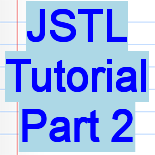JSTL Tutorial Part 2
// demo4.jsp<%@ page contentType="text/html" %>
<%@ taglib prefix="c" uri="http://java.sun.com/jstl/core" %>
Example
<html>
<body
bgcolor=lightblue>
<form
method=post
action="demo3.jsp">
<select name="combo1">
<option
value="1">1
</option>
<option
value="2">2
</option>
<option
value="3">3
</option>
<option
value="4">4
</option>
<option
value="5">5
</option>
<option
value="7">7
</option>
</select>
<input
type=submit>
<c:set var="s" value="${param.combo1}" />
Today is
<br>
<font size=24 color=red>
<c:choose>
<c:when test="${s==1}">Sunday </c:when>
<c:when test="${s==2}">Monday</c:when>
<c:when test="${s==3}">Tuesday</c:when>
<c:when
test="${s==4}">Wednesday</c:when>
<c:when test="${s==5}">Thursday</c:when>
<c:otherwise>
select between 1 & 5
</c:otherwise>
</c:choose>
</body>
</html>
---------------------------------------------
Demo-5 deals with Iteration tag.
We are familiar with the 'for-each' construct.
JSTL's 'for-each' also has the same functionality.
In the following example, we have a String array. named as
'colors'.
By using the <c:forEach> tag, we
iterate through the array and display the values.
------------------------------------
//demo5.jsp
<%@ page contentType="text/html" %>
<%@ taglib prefix="c"
uri="http://java.sun.com/jstl/core" %>
<%
pageContext.setAttribute("colors",
new String[]
{"red","green","blue","orange","black"} ); %>
<table>
<c:forEach var="n" items="${colors}"
varStatus="a">
<tr>
<td> <c:out value="${a.index}" /> </td> <td> <c:out
value="${a.count}" /> </td>
<td> <c:out value="${a.first}" /> </td>
<td> <c:out value="${a.last}" /> </td>
<td> <c:out value="${a.current}" /> </td>
<tr>
</c:forEach>
</table>
We get the following display, when we execute the
program.
|
0
|
1
|
true |
false |
red
|
|
1
|
2
|
false |
false |
green |
|
2
|
3
|
false |
false |
blue |
|
3
|
4
|
false |
false |
purple |
|
4
|
5
|
false |
true |
black |
===============================================
<c:forEach> action tag contain the following
attribute list:
items
: the collection of items like String[]
var : a symbolic name for
the collection
begin
: the starting index of iteration
end
: the ending index of iteration
step
: incremental step
varStatus:
symbolic name for current status.
If we assign the symbolic name 'a' for the status, we are
able to access its properties such as index, count, whether it is first item,
whether it is last item and the current value.
Demo6 also
deals with iteration tag.In the following example, the iteration starts at value
3 and ends at value 8 .It displays the values of n in each iteration.Each
iteration increments the value of n automatically by 1,if step is not specified.
-----------------------------------------------
demo6.jsp
<%@ page contentType="text/html" %>
<%@ taglib prefix="c"
uri="http://java.sun.com/jstl/core" %>
<c:forEach var="n" begin="3" end="8" >
<c:out value="${n}" /> <br>
</c:forEach>
|
3
|
4
|
5
|
6
|
7
|
8
|
===============================================
Demo7
deals with JSTL's 'forTokens'
tag.<c:forTokens>, which iterates over a string of tokens separated by a
set of delimiters like the stringTokenizer class in Java.
--------------------------------------------
demo7.jsp
<%@ page contentType="text/html" %>
<%@ taglib prefix="c"
uri="http://java.sun.com/jstl/core" %>
<c:set var="s" value="SAM,DELHI,MCA,24,90" />
<html>
<body>
<table border="1">
<tr>
<th>Name</th>
<th>Place</th>
<th>Degree</th>
<th>Age</th>
<th>Mark</th>
</tr>
<tr>
delims="," var="token" >
</c:forTokens>
</tr>
</table>
<br>
</font>
</body>
</html>
------------------------------------------
|
Name |
Place |
Degree |
Age |
Mark |
|
kala |
Kkdi |
mca |
23 |
87 |
------------------------------------------
The essential attributes of 'forTokens' tag are:
Attribute
Description
items
The string to
tokenize
delims The delimiter
characters
that separate
the tokens of
the string.
===============================================
Demo8 deals
with URL-Related actions.<c:import>action tag imports the conent of a
URL-based resource and provides a simple way to access URL-based resources that
can either be included or processed within the JSP..
In the
following example,the import action tag imports the content of welcome.htm file
here.So it displays the contents of demo8.jsp and welcome.htm.
--------------------------------------------
// welcome.htm
<html>
<body>
WELCOME
<br>
</body>
</html>
---------
demo8.jsp
<%@ taglib
prefix="c"
uri="http://java.sun.com/jstl/core" %>
<c:import url="welcome.htm"/>
<c:out value="to our web-site!" />
===============================================
In demo9 we discuss the <c:url> action tag.
<c:url> prints the value of URL.It is easier
to construct the hyperlinks.It is useful for session preservation
(URL-Encoding).
In the following example,we use <c:url> to make a
link to another html file. When we execute demo9, we get a link , with text
'send'.
When we click on the link, we are taken to welcome.htm.
--------------------------------------
demo9.jsp
<%@ taglib prefix="c"
uri="http://java.sun.com/jstl/core" %>
<a
href="<c:url
value="http://localhost:8080/welcome.htm/
send
</a>
--------------------------------------
===============================================
demo10 deals
with <c:redirect> action tag.
This tag forwards the browser to the specified URL .
demo10.jsp
<%@ page contentType="text/html" %>
<%@ taglib prefix="c"
uri="http://java.sun.com/jstl/core" %>
<c:redirect
url="http://localhost:8080/welcome.htm />
===============================================
Finally, <c:param> tag is
useful to send some parameter value to the page to which redirect occurs. In our
example, the code redirects to sample.jsp, but it takes the param named 'a'
with value='SAM' , to the redirected page.
And, the sample.jsp accepts this param and prints it.
<c:out value="${param.name1}"/>
----------------------------------------------
demo11.jsp
<%@ page contentType="text/html" %>
<%@ taglib prefix="c"
uri="http://java.sun.com/jstl/core" %>
<c:redirect url="http://localhost:8080/jstldemos/
core/sample.jsp" >
</c:redirect>
-------------------------------------------
( in a different file)
sample.jsp
<%@ taglib prefix="c"
uri="http://java.sun.com/jstl/core" %>
<c:out value="${param.name1}"/>
And to end our whirlwind tour of core-tags in JSTL, here is
a demo which mixes EL of JSP-2(Expression Language of JSTL) with 'Expression'
(also known as request-time Expression ) of JSP1.2.
demo12.jsp
<%@ page contentType="text/html" %>
<%@ taglib prefix="c"
uri="http://java.sun.com/jstl/core" %>
JSTL welcomes <br>
<c:out value="${param.text1}" />
<br>
JSP Expression welcomes
<%=request.getParameter("text1") %>
